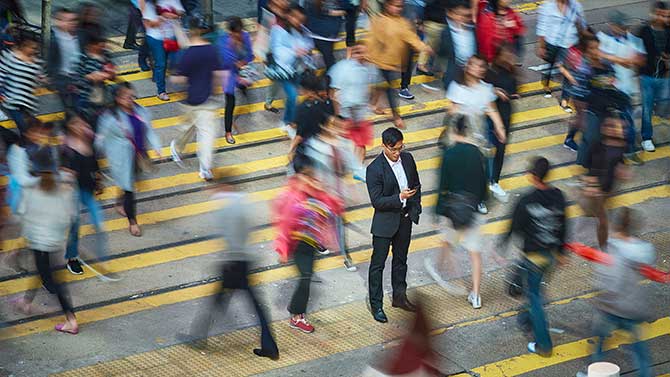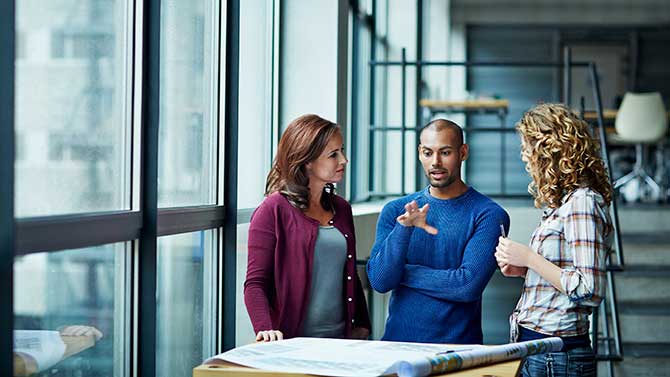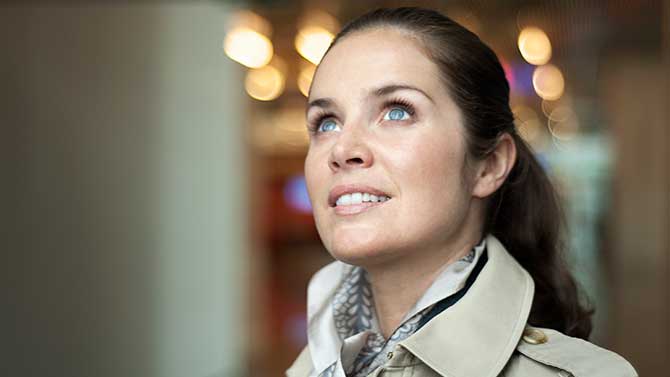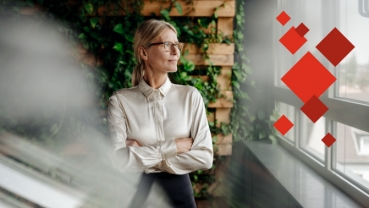
Working towards a better world after COVID-19
Now that vaccination programmes seem to have brought the COVID-19 pandemic under control and we are returning to “normal”, we are venturing to look further ahead, and we are asking ourselves what the post-COVID-19 world will look like. That world will not be entirely the same as before. Doing business, working, and living in an online environment have really taken off. Entire sectors and business models have been rendered obsolete or radically altered by the developments. There has been a change in people’s views on what makes businesses sustainably successful, and there is increased public support for strong government.

Finding a good balance
We too had to get accustomed to working remotely and to the sudden new work-life balance. Contact with clients suddenly had to take place via video calls, and the acquisition of new contracts no longer involved on-the-spot presentations. We are proud of what we have achieved in these difficult times, and that we have been able to maintain the high quality of our services.
As we move towards the new “normal”, the challenge is to find a good balance between working from home and working at the office or the client’s premises. The choice our people make as to their work location not only has an impact on our ecological footprint but can also affect people’s well-being and personal development, internal cooperation, the relationship with our clients and our networks, and the quality of our services. Where hybrid working is concerned, we will always need to take these aspects into consideration.
Our framework for our new way of working
We have developed a framework to help our people implement hybrid working. It comprises themes that need to be considered, such as how wellbeing is affected by working from home or at the office and the impact of the required travel on our Net Zero ambition, but also client interests and cost-efficiency.

A new tomorrow; focus on value creation
Our commitment to addressing challenges in an integrated manner is also reflected in our service provision. Last year, we selected four societal themes that co-determine the strategic agenda of many clients and at the same time reflect an important societal issue, namely ESG, Future of Work, Risk & Regulation, and Future of Finance.
Those themes are relevant to our clients, to ourselves, and to society as a whole. They are themes where together we can make a difference by harnessing the power of our people by creating unique and unexpected combinations of expertise, experience and technology, which together provide new and unexpected solutions. But we also do so by listening carefully to what clients really need and to what society demands of us. This is how we build trust and ensure sustainable progress.
Value creation
In the post-COVID era, the road to recovery for organisations primarily involves creating value. Strategic reorientation, digital transformation, and a greater focus on human potential are shifting the focus to long-term value creation. Mergers and acquisitions will be an important means of accelerating value creation in the coming years, which is why we are adding a fifth theme in our new financial year: value creation.
Gert-Jan van der Marel, responsible for the value creation theme at PwC, notes: “The recent disruptive developments have drawn attention to insufficiently highlighted sources of value such as purpose and resilience”. If organisations devote attention to these in the right manner, they can create value, but if they neglect them they can destroy it. “A more holistic way of thinking about value is of great importance,” says Van der Marel, “not only for organisations, but also for society in general.”

Thinking along with our stakeholders
Continuing the dialogue with our stakeholders gives us a better understanding of what matters to our stakeholders, what they expect from PwC and what we need to do to meet those expectations. During discussions in the past year, they clearly indicated that we must engage with them far more, that we must involve them more in our own transformation towards a purpose-led and values-driven organisation, and that we must make clearer how we fulfil our role within society. This compels us to constantly ask ourselves how we can maintain our right to exist in the longer term.

How we continue to transform
Global trends and society’s changing expectations are also accelerating our transformation that we initiated a few years ago. More than we sometimes realise, our success is not only determined by ‘what’ we do, but also more over by ‘how’ we do it. By connecting more with the client we have a greater view on their (actual) problem. Together we then can find better, integrated solutions.

A look at our strategy
The acceleration in global changes caused by COVID-19 has led to a recalibration of our strategic vision. To meet the challenges of our time, be successful and to meet the expectations of their stakeholders, companies and organisations need to build trust and deliver sustainable outcomes. We want to contribute by developing new and sustainable solutions.
We develop these solutions by deploying a wide variety of people in unexpected combinations, by offering quality, our knowledge, creativity, and our ingenuity to look at things from multiple perspectives and by using technology. This way we build trust and create sustainable progress towards a new tomorrow. We call this sum The New Equation.

Working towards a better world after COVID-19
Now that vaccination programmes seem to have brought the COVID-19 pandemic under control and we are returning to “normal”, we are venturing to look further ahead, and we are asking ourselves what the post-COVID-19 world will look like. That world will not be entirely the same as before. Doing business, working, and living in an online environment have really taken off. Entire sectors and business models have been rendered obsolete or radically altered by the developments. There has been a change in people’s views on what makes businesses sustainably successful, and there is increased public support for strong government.



















